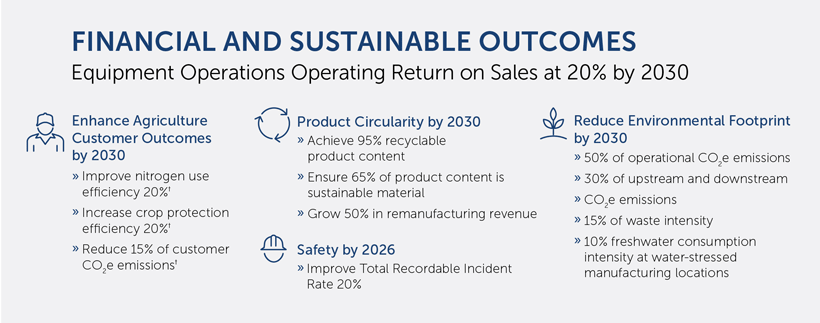 Investment Team Voices Home Page
Investment Team Voices Home Page
ESG in Focus: Traditional Cyclicals Seize the Opportunity of Sustainability
Jim Madden, CFA
As individuals, governments, and investors increasingly prioritize ESG principles, companies recognize that embracing the tenets of ESG is beneficial for business as well as society. Moreover, in addition to addressing such challenges as food sustainability and improved working conditions, ESG considerations often align and intertwine with innovation and productivity enhancement.
What’s exciting for us as investors is that ESG-friendly transformations are happening all across the economy—not only in newer companies and growth industries but also among well-established bellwethers in cyclical sectors. Case in point: Although many people may think of John Deere as a staid agricultural company, we view the company as agile and forward-looking in its approach to ESG.
John Deere’s green and yellow tractors have been synonymous with farming since its founder invented one of the first steel plows capable of tilling American Midwest prairie soil without clogging. As the agricultural landscape has evolved from predominately family farms to commercial operations, the company also finds itself adapting to an ever-changing world.
In 2020, Deere announced its new vision and operating model to accelerate success through the integration of smart technology and the company’s legacy of manufacturing excellence. Following on this commitment, Deere just released its 2021 Sustainability Report, a recap and a plan that is ambitious in its breadth and depth. In the report, Deere aligns with both the Task Force of Climate-related Financial Disclosures and the Sustainability Accounting Standards Board, and also outlines its Deere “Smart Industrial” strategy. As part of this strategy, Deere aims to digitally connect 1.5 million machines by 2026. Connected machines combined with data analysis will help customers improve productivity while requiring fewer inputs.
Deere is also taking better care of its employees through a recent six-year labor agreement. The pact allocates an additional $3.5 billion to wage increases, signing bonuses, and enhanced retirement benefits, as well as other enhancements.
Below are several highlights of what company management hopes to accomplish by 2030:
Deere’s Financial and Sustainable Goals: Good for Business, Good for Employees, Good for Society

Source: Deere.com, 2022 Deere & Company At A Glance. †Per unit of output.
Deere is a major player in a field that is crucial to meeting a fundamental societal need, and it is encouraging to see the company continuing to understand the connection between nonfinancial and financial outcomes.
Opinions and estimates offered constitute our judgment and are subject to change without notice, as are statements of financial market trends, which are based on current market conditions. We believe the information provided here is reliable, but do not warrant its accuracy or completeness. This material is not intended as an offer or solicitation for the purchase or sale of any financial instrument. The views and strategies described may not be suitable for all investors. Opinions are subject to change due to changes in the market, economic conditions or changes in the legal and/or regulatory environment and may not necessarily come to pass. This information is provided for informational purposes only and should not be considered tax, legal, or investment advice. References to specific securities, asset classes and financial markets are for illustrative purposes only and are not intended to be, and should not be interpreted as, recommendations.
18960 0522
Cookies
This website uses cookies. By continuing to use this website, you consent to the use of cookies. Learn more about our cookie usage.

